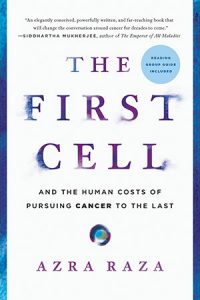
Author: Azra Raza
Publisher: Basic Books
Pages: 368
Price: Rs. 2,195

The First Cell by Dr. Azra Raza defies pigeon-holing because it is a delicate balancing act between the rigours of science and the audacity of hope. In its unvarnished and clear-eyed look at cancer, the ‘Emperor of Maladies,’ as Dr. Siddhartha Mukherjee has termed it, it reminds one of the film 12 Years a Slave, which delineated the trials of African-American slaves. Despite the harrowing content, one could not look away as the darkest crevices of the human mind were laid bare.
In a similar manner, Dr. Raza’s book is not an easy read, but the questions she asks are essential for any society. The book encapsulates her call for a paradigm shift in the treatment and research on cancer so that it can be detected in its initial stages. She advocates for catching the first cell through a blood test at the cellular level. In doing so, The First Cell strips away the veneer of popular treatment and therapy that patients undergo in their battle against cancer.
Dr. Raza is an eminent oncologist at the Columbia Presbyterian Hospital researching leukaemia, who is unafraid to look the medical establishment and Big Pharma in the eye. After 40 years as an oncologist, she says she was compelled to write this book after the death of her daughter’s 22-year-old best friend, who died of an aggressive brain tumour that was detected too late.
Dr. Raza highlights the need to research to address prevention and the initiation of the cancer process — locate and destroy the first deadly cells.
“To begin the ending, we must end the beginning. Prevention will be the only compassionate, universally applicable cure. It is not prevention through lifestyle changes. Individuals with pristine eating and exercising habits get cancer because cancer-causing mutations accumulate as natural consequences of reproduction and aging of cells. The prevention I am talking about is through identification and eradication of transformed cancerous cells at their inception, before they have had a chance to organise into a bona fide malignant, incurable disease. This may seem an unattainable, utopian dream, but it is achievable in a reasonable time. We are already using sophisticated technology to detect the residues of the disease that linger after treatment, the last cancer cell. Can we not reverse the order of things and use the tests to detect the first?”
According to Dr. Raza, we have made little progress in fighting cancer over the last 50 years and it is time to look at the “ghastly toxicities of therapies.” She castigates pharmaceutical companies for concentrating on drugs that often fail and at best achieve, on average, a few extra months of life. “For the next quantum leap, fundamentally different strategies have to be developed. The two immediate steps should be a shift from studying animals to studying humans and a shift from chasing after the last cancer cell to developing the means to detect the first cancer cell.”
Dr. Raza’s clarion call is both an indictment of the infrastructure of the pharmaceutical industry and the research that bolsters it and leads to the demand and supply of drugs whose efficacy may be in doubt.
The writer has a refreshing approach to a serious and intense topic. She shines a spotlight on the relationship between a doctor and a patient. The book is illuminated with stories of her patients and their families, which helped in her understanding of the disease and the way it impacts families. She advocates the need for doctors to connect with their patients by listening to them as they contemplate their mortality and struggle with agonising choices.
“Why are we so afraid to tell the stories of the majority who die? Why keep promoting the positive anecdote? Why all this mollycoddling?”
She quotes Marcel Proust who said that the real voyage of discovery is not in seeking new landscapes but in having new eyes. “I experience a slightly different version of this dictum practically on a daily basis, developing new insights through my patients’ eyes.”
One of the patients whose story Dr. Raza tells is that of her own husband, Harvey. She details the burden of being her husband’s oncologist as he fought the disease. “What does time mean to people who are running out of it? How does a man hearing the footsteps of death approach closer each day negotiate the themes of dying, loss, pain, grief, the withering sense of waste, the unbearable, crushing sadness of things that will be left undone?”
She talks of Omar Azfar’s indefatigable will to live and an unflagging optimism of will, despite painful treatments and multiple surgeries. “He never lost the life of the mind. Omar called me one evening to say that, as opposed to someone who has come up with a list of the hundred books one must read before dying, he had compiled a list of a hundred books that one must read in order to live.”
At its heart, The First Cell is a compelling book about death and despair. It’s also a book about hope and life.

The writer is a senior journalist and the author of The Mercurial Mr. Bhutto & Other Stories.



